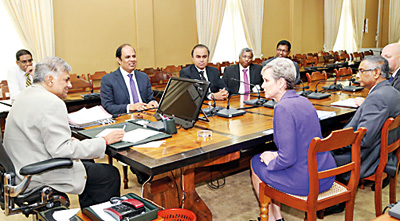International expert calls for highly challenging competency tests when selecting boards/ committees
View(s):Corporate directors need to follow a process to improve effectiveness and practise a robust governance structure while always doing a competency test when selecting boards and committees, an international expert advocated.

IFAC President Ms. Olivia Kirtley and its CFO. Russel Guthrie paid a courtesy call on Prime Minister Ranil Wickremesinghe on Tuesday. Also present were CA Sri Lanka President Arjuna Herath, Vice President Lasantha Wickremasinghe, CEO - Aruna Alwis, Vice President of the South Asian Federation of Accountants (SAFA) Naeem Akhtar Sheikh, President - CMA Sri Lanka Prof. Lakshman R. Watawala, Chairman - CIMA Sri Lanka Vipula Gunatilleka and CIMA Regional Director Bradly Emerson.
“This test should be highly challenging too. This makes sure that directors are equipped with essentials where only then can they stand out and be more innovative from the group,” Olivia Kirtley, President International Federation of Accountants (IFAC) Board said at an Institute of Chartered Accountants organised a CEOs’ Breakfast Forum on ‘Strong Governance, Health Business recently in Colombo.
“Directors have to gather experience and risk management has a long way to go. Then only will it contribute to moulding true leaders within the corporate world. The initial steps need to be taken to set up a risk committee but the process in setting up this committee should be meaningful. So risk and operation go hand in hand but risks cannot ride us to the future,” she said.
Reminiscing her experiences, she said that three years ago, when she was working for the Rockefeller Foundation where information was its core business, training and competencies were needed to be involved in the accountancy profession. “Every level of the corporate world requires a leadership role and for this, strong corporate governance is what needs to be followed and practised. This is the most effective way to survive,” she said, noting that it’s essential to highlight the existing targets and see how you could minimise the gaps.
Acknowledging that she understands the accounting profession, Ms. Kirtley said, “I have been in your shoes in the profession and also in the corporate world. There’s an incredible amount of work that needs to be done in terms of education and in setting up standards. The IFAC was established in 1977 and the Institute of Chartered Accountants has been a member of IFAC since 1978. Governments relate to us in almost everything we do. During the time of the tsunami I happened to be in Sri Lanka and we spent close to US$1 billion. Many people such as non-governmental organisations (NGOs) came in support of the government but $1 billion is quite a lot of money.” She added that she was on board an NGO and was doing economic work there. “Rather than working for many countries we chose a single country to work on and maximise benefits. Therefore, we chose to work for Sri Lanka. The money that was contributed was properly used. We provided sanitary facilities for the affected people, provided boats to fishermen and even financial aid.”
When looking at governance, she said that it’s important to look at what it can deliver to public organisations. “Therefore, the importance of strong corporate governance was brought to the limelight. We have seen the difference that good governance can do. Sri Lanka is slowly growing markets in the South Asian region. The economic outlook on Sri Lanka is outstanding and it is stronger towards strengthening good governance.”
Corporate ethics contribute to long-term goals in development and this requires following up business models that ensure sustainability, she said, adding that Sri Lanka is a country that is internationally integrated and as such it has many government rules and regulations. “Therefore, resources are needed at large to upgrade the lives of people or basically make them live like before.”


